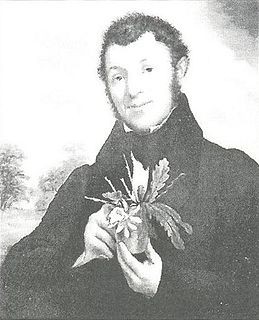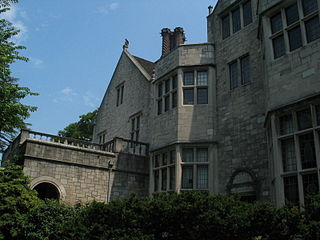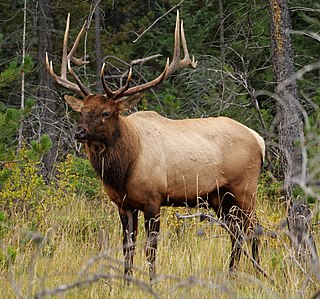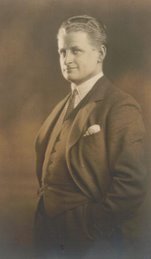
The Royal Horticultural Society (RHS), founded in 1804 as the Horticultural Society of London, is the UK's leading gardening charity.

The RHS Chelsea Flower Show, formally known as the Great Spring Show, is a garden show held for five days in May by the Royal Horticultural Society (RHS) in the grounds of the Royal Hospital Chelsea in Chelsea, London. Held at Chelsea since 1912, the show is attended by members of the British Royal Family.

Clement Clarke Moore was an American writer and Professor of Oriental and Greek Literature, as well as Divinity and Biblical Learning, at the General Theological Seminary of the Protestant Episcopal Church, in New York City. The seminary was developed on land donated by Moore and it continues on this site at Ninth Avenue between 20th and 21st streets, in an area known as Chelsea Square. Moore's connection with the seminary continued for more than 25 years.

William Bateson was an English biologist who was the first person to use the term genetics to describe the study of heredity, and the chief populariser of the ideas of Gregor Mendel following their rediscovery in 1900 by Hugo de Vries and Carl Correns. His 1894 book Materials for the Study of Variation was one of the earliest formulations of the new approach to genetics.

Adrian Hardy Haworth was an English entomologist, botanist and carcinologist.
William Purdom was a British plant explorer. After being apprenticed as a gardener at Brathay Hall in the English Lake district, he travelled to London to work at the Hugh Low, Enfield Nursery, then onto the Veitch establishment at Coombe Wood. In 1902, Purdom took up a position as a gardener at Kew Botanic Garden soon becoming promoted to a sub-foreman (leading-hand) position. Purdom became heavily involved with early Union activities particularly promoting the rights of junior workers which eventually led to his unjustified dismissal. Despite being a bane to the, then, Kew Director, David Prain, the latter recognized the talents of William Purdom and recommended his employee as being very suitable as a plant collector for a joint venture by Veitch and the Arnold Arboretum of Harvard University to the northern provinces of China in 1909.

Planting Fields Arboretum State Historic Park, which includes the Coe Hall Historic House Museum, is an arboretum and state park covering over 400 acres (160 ha) located in the village of Upper Brookville in the town of Oyster Bay, New York.
The Victoria Medal of Honour (VMH) is awarded to British horticulturists resident in the United Kingdom whom the Royal Horticultural Society Council considers deserving of special honour by the Society.

Sir Harry James Veitch was an eminent English horticulturist in the nineteenth century, who was the head of the family nursery business, James Veitch & Sons, based in Chelsea, London. He was instrumental in establishing the Chelsea Flower Show, which led to him being knighted for services to horticulture.

The hybrid elm cultivar Ulmus × hollandica 'Wredei', also known as Ulmus × hollandica 'Dampieri Aurea' and sometimes marketed as Golden Elm, originated as a sport of the cultivar 'Dampieri' at the Alt-Geltow Arboretum, near Potsdam, Germany, in 1875.

The elk, also known as the wapiti, is one of the largest species within the deer family, Cervidae, and one of the largest terrestrial mammals in its native range of North America, as well as Central and East Asia. The common name elk, used in North America, creates confusion because the larger Alces alces, which is called moose in North America, is also called elk in British English, and related names in other European languages. The name "wapiti" is sometimes used in North America for Cervus canadensis. It originates from the Shawnee and Cree word waapiti, meaning 'white rump'.

Ralph Hancock was a Welsh landscape gardener, architect and author. Hancock built gardens in the United Kingdom in the 1920s, 1930s and 1940s and in the United States in the 1930s. He is known for the roof gardens at Derry and Toms in London and the Rockefeller Center in New York City, the garden at Twyn-yr-Hydd House in Margam, and the rock and water garden he built for Princess Victoria at Coppins, Iver, England.
Henry Winthrop Sargent, American horticulturist and landscape gardener.

Tony Kirkham MBE VMH is the former Head of Arboretum, Gardens & Horticulture Services, Royal Botanic Gardens, Kew.

Sir Arthur William Hill was Director of the Royal Botanic Gardens, Kew, and a noted botanist and taxonomist.
St. James' Church, Standard Hill was a Church of England church in Nottingham.

Lee and Kennedy were two families of prominent Scottish nurserymen in partnership for three generations at the Vineyard Nursery in Hammersmith, west of London. "For many years," wrote John Claudius Loudon in 1854, "this nursery was deservedly considered the first in the world."

Beverly Thomas Galloway was an American plant pathologist and horticulturist who was the first head of the Division of Vegetable Physiology and Pathology of the United States Department of Agriculture (USDA). He served for one year as Assistant Secretary of Agriculture of the United States, and has been described as "arguably the single, most influential figure involved in the early growth and development of plant pathology and the plant sciences generally in the USDA." He served as president of the Botanical Society of America, was a charter member of the American Phytopathological Society, and was a fellow of the American Association for the Advancement of Science.

Waterperry Gardens are gardens with a museum in the village of Waterperry, near Wheatley, east of Oxford in Oxfordshire, England.















